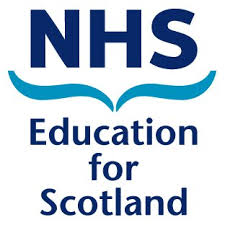
Quality Improvement (QI) Activity is an essential part of every-day practice for dentists and their teams.
The memorandum to the letter from the interim Chief Dental Officer PCA(D)(2019)10 includes an expectation that all dental team members should undertake four QI eLearning modules to enable them to apply this different approach to support improvement in their practices.
This 2019 document contains background information and links to four elearning modules in Quality Improvement hosted by Turas for NHS Education for Scotland.
These modules are recommended for all members of the dental team. It is important that QI should involve the whole dental team. Each module will take approximately 30 minutes to complete. On completion of the 4 modules, members of the dental team will be able to download certificates providing 2 hours of verifiable CPD in total. This learning activity will fulfil GDC Development Outcomes B and C.
Click the download link above to get started.
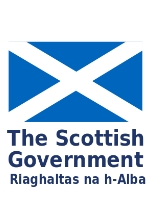
From 1st April 2016, there is a mandatory training requirement for dentists applying to join the dental list in Scotland:
- for the first time,
- those returning to clinical practice within 5 years, and
- those returning after 5 years or more.
Further details are available are in PCA2016(D)05
The mandatory training programme training will be run by NES and details are available on their website
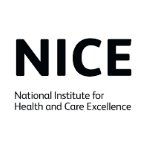
This clinical guideline offers evidence-based advice on the care and treatment of children and young people under the age of 19 having sedation for therapeutic or diagnostic procedures.
Resources include:
- Full guideline documents
- Quick reference guide
- NICE guidance written for patients and carers
- Documents to support implementation of this guidance:
- Audit support
- Baseline assessment tool
- Costing report
This is a Healthcare Improvement Scotland (HIS) appraisal of the guidance issued by the National Institute for Health and Clinical Excellence.
Background
This NICE appraisal has been considered by NHS Quality Improvement Scotland through its revised procedure of processing of NICE appraisals. NICE has said that HealOzone is not recommended as a treatment for specific types of tooth decay, unless it is being used in a clinical trial. The reason for this was that there was not enough reliable evidence that HealOzone is more effective than existing treatments for decay of the biting surfaces and roots of the teeth. No important differences were identified for this NICE appraisal, and NHS Quality Improvement Scotland advises that it is as valid for Scotland as for England and Wales.
NHSScotland should note that:
- No important differences were identified for this NICE appraisal, and NHS Quality Improvement Scotland advises that it is as valid for Scotland as for England and Wales.
- NHSScotland should take account of the NICE appraisal and this NHS Quality Improvement Scotland email in its planning, funding and provision of services to ensure that recommended drugs or treatments are made available to meet clinical need.
- NHS Quality Improvement Scotland advice represents the evidence-based view of NHS Quality Improvement Scotland.
- This advice does not override or replace the individual responsibility of health professionals to make appropriate decisions in the circumstances of their individual patients, in consultation with the patient and/or guardian or carer.
- No other publications on the NICE appraisal will be issued by NHS Quality Improvement Scotland.
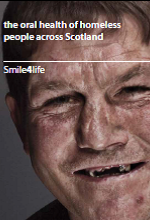
Scottish Oral Health Improvement Homelessness Programme: Smile4life
Developing, implementing and evaluating an oral health preventive programme for homeless populations across Scotland.
The findings of the Smile4Life Report on the oral and psychosocial health of people experiencing homelessness in Scotland were presented at a meeting held on 19th May 2011,at the Dementia Services Development Centre,University of Stirling.
Smile4Life Report
This report is about the oral health of homeless people in Scotland.
A needs assessment survey of 853 people experiencing homelessness in Scotland identified exceptional oral health needs among this population. Oral health was poor: 98% of those surveyed had experienced dental decay. Over 50% of the sample had had at least one tooth extracted. Sixty-eight percent of the sample stated that they only accessed dental care when experiencing pain or in an emergency. Over 20% of this population experienced severe dental anxiety.
Resources to support training and implementation
The Smile4life Guide for Trainers and associated Smile4life Intervention is an evidence-based resource for all health and social care professionals to deliver training to staff working directly with people experiencing homelessness. The overall purpose of Smile4life is to enable health and social care staff and support workers to provide evidence-based tailored oral health messages to meet the specific and exceptional needs of homeless (roofless and houseless) people in Scotland. Smile4life is currently being implemented in the majority of NHS Boards in Scotland.
Systematic Review of Prevention of Early Childhood Caries from The Scottish Evidence Based Child Health Unit. Funded by Health Scotland
Download a copy of the review
ICDAS is a recently developed International Caries Detection and Assessment System based on best available evidence for detecting early and later stage caries severity. Use of ICDAS should lead to the acquisition of better quality information which could then be used to inform decisions about appropriate diagnosis, prognosis, and clinical management of dental caries at both the individual and public health levels.
Visit the ICDAS website
This on-line learning resource from NES is designed for any professional who is working in the health care system at the primary care level (eg General Practitioner; Allied Health Professionals Dentists, Opticians, Public Health Nurses; District Nurses; Practice Nurses; and Dental nurses).
Visit the on-line resource
The Scottish Patient Safety Programme (SPSP) is a unique national initiative that aims to improve the safety and reliability of healthcare and reduce harm, whenever care is delivered. From an initial focus on acute hospitals, their work now includes safety improvement programmes for the following areas:
- acute adult
- maternity and children
- mental health
- primary care
Visit the SPSP website
The Centre for Evidence-based Dentistry (CEBD) , established in 1995, is an independent body whose aim is to promote the teaching, learning, practice and evaluation of evidence-based dentistry world-wide. In October 2013 the Centre moved to the Dental Health Services Research Unit at the School of Dentistry ,University of Dundee. The Centre is the Editorial base for the Evidence-based Dentistry Journal.
Visit the CEBD website
The General Dental Council (GDC) regulates the dental profession , setting standards, quality assuring education and by registering dental professionals. The GDC also takes action against those who work outside the law.
Visit the GDC website
The Knowledge Network is a national online knowledge service for health and social care. It provides high quality knowledge support for delivery of health and social care. The network provides:-
- Around 12 million information and learning resources from more than 100 quality assured health and social care providers
- A personal webspace
- Online community tools
Registration with the site provides access to additional facilities
- Customise The Knowledge Network homepage e.g. have your own list of favourite resources.
- Save searches you want to repeat.
- Share resources and communicate with colleagues through community websites and Shared Spaces.
Visit the Knowledge Network Website
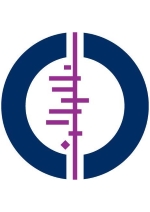
The Cochrane Oral Health Group (CHOG) is one of 53 review groups around the world belonging to The Cochrane Collaboration: an international non-profit and independent organisation, providing up-to-date information about the effects of health care.
CHOG is an international network of healthcare professionals, researchers and consumers preparing, maintaining, and disseminating systematic reviews of randomised controlled trials in oral health. Oral health is broadly conceived to include the prevention, treatment and rehabilitation of oral, dental and craniofacial diseases and disorders. The COHG has a website and a blog where you can find out more about them.
Visit the Cochrane Oral Health Group Website
Visit the Cochrane Oral Health Group Blog site

The Cochrane Library is a collection of six databases that contain different types of high-quality, independent evidence to inform healthcare decision-making, and a seventh database that provides information about groups in The Cochrane Collaboration.The Databases are:-
- Cochrane Database of Systematic Reviews
- Cochrane register of Controlled trials (CENTRAL)
- Cochrane Methodology Register
- Database of abstracts of Reviews of Effects (DARE)
- Health Technology Assessment Database
- NHS Economic Evaluation database
Go to the Cochrane library
This website from the Glasgow Dental School provides a very useful resource on oral cancer and detection for primary care professionals. It contains:-
- Introduction
- The role of primary health care professionals
- What is oral cancer?
- How common is oral cancer?
- Oral cancer mortality
- Oral cancer aetiology
- Oral cancer quiz
- Prevention of oral cancer
- Clinical presentation
- Clinical photographs
- Examination for suspicious lesions
- Patient counselling
- The referral process
Visit website
All dental professionals have a duty to keep their skills and knowledge up to date. CPD for dentists and DCPs is defined in law as activity which contributes to their professional development and is relevant to their practice or intended practice.
Guidance on CPD is available from the General Dental Council (GDC)
Visit the CPD page of the GDC website
Clinical Audit and Significant Event Analysis (SEA) are recognised as important elements of clinical governance which contribute to patient safety in dental primary care. In order to maintain a high standard of patient care it is important to continually review performance and strive to improve. Clinical audit has been a requirement for dentists under the NHS Terms of Service since 2001.
The aim of this site is to provide access for practitioners to the information needed in order to begin, or continue, to use various types of clinical audit activity, such as clinical audit (CA) or significant event analysis (SEA) so as to make improvements to their clinical practice
Visit the NES Clinical Audit and SEA site
The Faculty of General Dental Practice (FGDP) was formed in 1992 as the academic home for general dental practitioners. FGDP(UK) is based at the Royal College of Surgeons of England .
The aim of the Faculty is to improve the standard of care delivered to patients through standard setting, publications, postgraduate training and assessment, education and research.
Visit the Faculty website
The Royal College of Surgeons of Edinburgh is one of the oldest surgical corporations in the world. Its story began in the late 1400s and was formally founded in 1505. The Royal College of Surgeons of Edinburgh, has dedicated itself to promoting the highest standards in surgical education, training and clinical practice.
The Faculty of Dental Surgery was established in 1982 and has almost 3000 Fellows and Members worldwide and its own Council
Visit the College website
The Royal College has been representing members for over 400 years . The dental faculty was established in 1967 the college is committed to supporting dentists and dental care professionals with their education, training and continuous professional development at every stage of their career from registration to maturity.
Visit the College website





